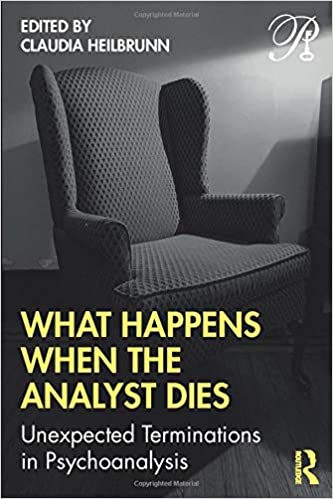Having a good conversation about a painful topic is bittersweet. Having a good conversation about loss, for instance, has sweetness mixed with the core bitterness of the topic, and I think the sweetness comes from the truth we discover and the understanding we come to share. Even loss–and our attention to loss–can become a way of connecting with others, a way of discovering and sharing insights.
A few days ago, I listened to a recent NBN interview with Claudia Heilbrunn on her book What Happens When the Analyst Dies: Unexpected Terminations in Psychoanalysis (Routledge, 2019). The main title of the book puts the emphasis on the death of the analyst, while the subtitle shifts the emphasis on the termination of the analysis. The main title, referring to the analyst as a person, doesn’t associate death with the unexpected. A person is mortal, it is not all that surprising that they die, if we keep in mind their personhood. The subtitle, referring to the analysis, brings in the word “unexpected.” Analysis itself isn’t a mortal being, and because of that we might forget that it can end. The termination of an analysis could be surprising, very surprising, in so far as we regard analysis as infinite. Isn’t this a general point about our projects and how they affect our self-understanding? The open-endedness and infinitude of what I do (a project) conceals the finitude of what I am (a mortal subject).
The NBN host, Christopher Russel, was great in guiding the conversation and adding his own insights to the interview. It was clear that both Christopher and Claudia cared about the topic, had been personally impacted by the kind of loss they were talking about, and indeed wanted to talk about it. It was a bittersweet conversation, which is to say it was a good conversation. It was warm, simple, finite, inspired by and aware of human finitude and our mortality. Yes, even the analyst dies. Even the teacher dies. Despite the fact that these figures might seem like the most stable part of one’s otherwise chaotic reality. And what does our surprise say about us? What does the difficulty in communicating the pain of such a loss say about us? What now? Where do we go from here?
There was another feature of the conversation that I very much liked: it started small, with a well-defined and -specified topic, and then moved into broader territories. We might begin by recognizing that not all losses are the same, and later we recognize that there might be common qualities in different kinds of losses, if we think about them–and try to make sense of them–long enough. Christopher and Claudia moved into other relevant areas–attachment, relationships, memory, self-image, family, and place (as in the place of therapy), and I think they couldn’t have dealt with those related topics so beautifully, had they not started their conversation with a very specific kind of loss, which was deeply relevant to them both, the reality of which they both felt and recognized.
